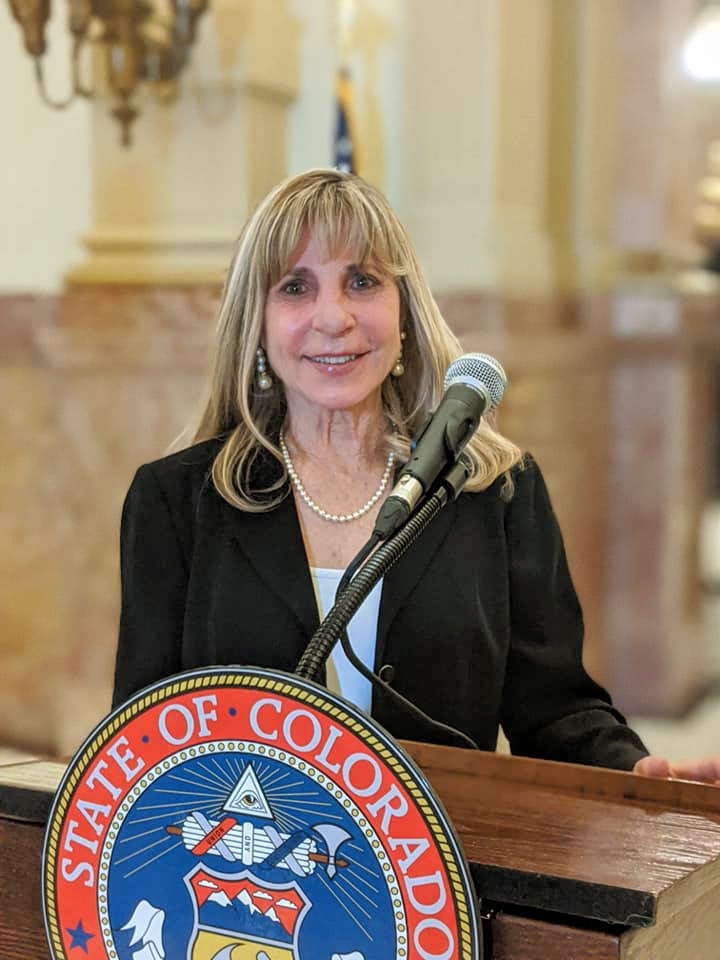While proud of the position, this elector believes the Electoral College system should end
Nita Lynch is one of the frequent faces around Westcliffe throughout the year, but during presidential election years, she has the honor of being one of Colorado’s ten electors for the Electoral College of Colorado.
On Tuesday, December 17, Colorado’s electors gathered at the Governor’s Office inside the Colorado State Capitol building in Denver to cast their ballots for the Harris/Walz ticket that won Colorado in the general election last November.
“It was such an honor and a thrill to have been elected as one of the ten electors for Colorado,” Lynch stated in a message to the Tribune. “I was one of the two At-Large electors, which meant we represented the entire state. Since Colorado voters elected Kamala Harris as their candidate, all the electoral votes went to Harris/Walz.”
For most of the history of the United States, the votes cast by electors have been ceremonial. However, in 2016, the institution of the Electoral College, like so many of the nation’s institutions, has been the subject of fierce controversy that is a current friction point that dates back to the founding of the nation.
When the United States Constitution was laid down in 1789, the first pressures and growing pains of the new Industrial Revolution were evident in a compromise made in the founding documents of the new nation. For the first time since antiquity, urban economies were growing at such a rate that they threatened to dwarf rural representation. At the time, most of the population of the United States was located in the center part of the nation around Virginia, Pennsylvania, and Maryland, which had sizeable urban trading economies and large numbers of slaves in Virginia. However, the rural southern states also depended on trade with urban economies, such as the textile cities of Manchester in England, which bought nearly all of the cotton produced in Southern plantations at the time.
Small and rural states felt that if the President of the United States were elected by popular vote, they would always be outvoted. At the time, loyalty to each individual state was much more important than loyalty to the United States, and each state desired equality among states despite the size of its population.
A compromise was struck that each state would receive two senators regardless of the size of the state they came from. House of Representatives would be selected by the voting population of each state with 30,000 people per representative (it is currently 700,000 persons per representative). Of course, the question immediately became: who would be considered a voting citizen? Traditionally, only white, wealthy men were considered voters. Women and enslaved people were not regarded as voting members of the original 13 colonies. But the new nation, with its emphasis on liberty and equality of representation, could not reconcile the hypocrisy of claiming all mankind was free but denying votes to blacks, free or slaves (women were mostly left out of the conversation of voting entirely).
The second compromise made in 1787 was that representatives would be based on the total population of a state, including women. However, enslaved people would only represent 3/5 of a person as they were not allowed to cast votes or take part in politics. Also, there were no accurate estimates of the populations of the 13 states at the time. Because of the importance of the population of each state, which dictated the number of house representatives, the first census was held in 1790 by Secretary of State Thomas Jefferson.
When it came to the presidential election, it was not decided by popular vote but by the number of electors each state had in total. The number of electors is chosen by tallying the two senators plus the number of representatives in the state. The majority of electors a presidential candidate won, decided who took the presidency.
Undoubtedly, this compromise was made at a time when women were not allowed to vote, and African-Americans were almost entirely shunned from public life.
For modern-day elector Nita Lynch, this compromise was born at a different time and needs to change. “I do not support the current electoral process, which is archaic and disenfranchises voters since it is ‘winner takes all.’ Regardless of one’s political leanings, we see an unfairness in that a few states determine the final outcome of our Presidential elections. I strongly support a popular vote.”
Lynch is not alone in this sentiment as Colorado, along with 17 other states plus the District of Colombia, have passed measures that would end the Electoral College and move the nation to a national popular vote for the President. Right now there are 209 electoral votes from states that have signed the “National Popular Vote Compact,” and 61 more are needed for the compact to go into effect.
While rural or Republican states have strongly resisted the notion of ending the Electoral College system in the past, as Republican presidential candidates generally lost the popular vote; that sentiment has softened somewhat with Donald Trump winning the popular vote in 2024.
With the election over, it is likely the topic will go dormant for a few years and come back into focus in 2028.
– Jordan Hedberg

